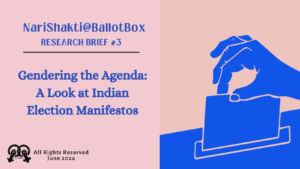
ABSTRACT
This research focuses on analysing gender issues within Indian political party manifestos, specifically examining the reinforcement of traditional gender roles, challenges to women’s empowerment, and the pursuit of gender equality. By studying the manifestos, the research aims to uncover trends, inconsistencies, and areas for improvement in addressing women’s issues, tracking policy evolution, and assessing the impact of these changes on women’s empowerment. The study seeks to address underrepresentation, evaluate policy effectiveness and understand community impacts, highlighting the need for gender-sensitive policies, inclusivity and the challenge of traditional norms to advance women’s rights and achieve genuine gender equality in the Indian political landscape.
The analysis reveals a concerning trend of manifestos framing women’s issues within the domestic sphere, perpetuating patriarchal notions and hindering progress towards gender equality. Despite recent policy initiatives addressing gender-based violence, reproductive health, political representation and migrant women’s rights, a persistent lack of gender inclusivity remains. The research emphasises the importance of comprehensive and transformative approaches, including challenging traditional gender norms, prioritising systemic reforms and promoting women’s active participation in politics, as essential steps towards achieving true gender parity in India.
ABOUT NariShakti@BallotBox
NariShakti@BallotBox is a unique series 3 of Research Briefs published by Mandonna Research Consultants on the key issues and challenges surrounding women and their participation in the Indian General Elections 2024.
India has been gloriously distinguished as the largest democracy in the world. With around 96 crore eligible voters set to decide the trajectory of our nation, it is crucial to acknowledge that the historic gap between male and female voters has significantly decreased over the years. An SBI Research Report (2024) has indicated that the number of female voters is on the rise and will reach the inflexion point by 2029. Projected trends indicate that by 2047, women may outnumber men as voters by 10% (SBI, 2024).
Women’s participation in elections, either as voters or poll contestants, is crucial for the sustainable and equitable development of the country and for achieving transformational economic and social changes. However, women continue to be marginalised in election activities, ranging from campaigns to popular perception and from representation to party manifestos.
To this end, the NariShakti@BallotBox series would aim to highlight some of the key aspects and issues at the intersection of the Lok Sabha elections of 2024 and women’s issues. We envision empowering key stakeholders through data-backed research and analysis for further action.
to read more, click “access me”
AUTHORED BY:
Manya Manra is a 2nd-year Psychology student at Lady Shri Ram College for Women and a Research Intern at Mandonna.
Sneha Kumari is a 2nd-year Political Science student at Lady Shri Ram College for Women and a Research Intern at Mandonna.
EDITED BY:
Falguni Mahajan is a Political Science graduate from Lady Shri Ram College for Women and the Founder-CEO of Mandonna.

